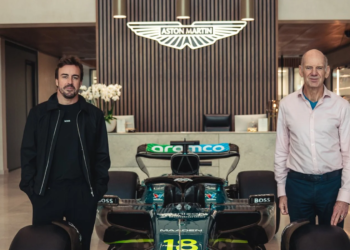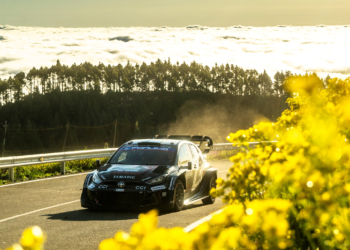History doesn’t repeat itself but it often rhymes, as Mark Twain probably didn’t say.
Whatever the phrase’s authorship, its sentiment applies to F1. That pursuit loves its echoes and parallels in its previous. And it occurred to me for the latest time recently, somewhere in among all of our lather, when Nico Rosberg surprised us all and not least his Mercedes bosses by announcing his retirement with pronto effect but five days after clinching his world championship crown in Abu Dhabi.
Indeed this particular historical parallel went beyond just being that, to the point of being almost precisely cyclical.
Of course, little is new in F1 and perhaps for the closest previous example to Nico’s shock decision we need to go back to Monza in September 1981. Then, a Williams seat was the one to covet. The team the preceding year had won the world championship double and it looked well on the way that year to bagging another. But that weekend the atmosphere in the pit seemed distinctly frosty.
Then as with Nico now the problem [with Alan Jones' retirement] was not so much the decision but its timing. Then as now it was late. Then as now the champion squad had few options as a result.
Perhaps, most thought, it was due to that Alan Jones – its world champion driver who had been integral in the team’s rise – had turned up to the royal park with a broken finger, the result of an altercation with some burly gentlemen on the Chiswick High Road in a road rage incident.
That may have been part of the explanation, but it was not it transpired the main factor. We found that out around a week later, when it was announced that Jones in Italy had dropped a bombshell on Frank Williams by telling him that he intended to retire at the year’s end.
And then as with Nico now the problem was not so much the decision but its timing. Then as now it was late, when the drivers at the top of the team’s probable replacement wish list had long been put under contractual lock and key elsewhere for the following season. Then as now the champion squad had few options as a result.
“I know I should have done it earlier” admitted Jones. “Problem was, every time I’d pick up the ‘phone to tell him, I’d get butterflies and hang up! It wasn’t that I was scared of facing the wrath of Frank, but because I just didn’t want to face the decision.”
Frank reflected later that “Alan’s indecisiveness always amazed me. In a car he was incredibly positive, but out of it just the opposite.”
Jones confessed also that his resolution, to quit Europe and return to Australia, was taken rather on a whim.
Yet this similarity with Jones' late-in-the-day departure is mere part of the neat cyclical nature with Nico’s case. As in addition the man who then got his big break after it all shook out was a certain Keke Rosberg. Nico's father.
“That’s exactly what it turned out to be,” he said. “It was my boy’s birthday on the Monday. We all had party hats on and everything – and then it started to piss down! We had to go inside, and I thought, ‘Oh, bugger it, at least if we were in Australia now we could stay outside…’”
Yet this similarity is mere part of the neat cyclical nature with Nico’s case. As in addition the man who got his big break from Jones’ late-in-the-day departure after it all shook out was a certain Keke Rosberg. Nico’s father, and of course the pair recently became only the second father-son F1 world champion combination. In many ways therefore Nico’s decision to walk at a moment’s notice having achieved his big ambition brought the Rosbergs’ story a neat full circle.
As outlined eloquently by Paul Fearnley recently though, beyond either Rosberg having a fine driving talent this apple fell rather far from the tree – in and out of the car. We know what they say about Nico – that he’s reserved, polished, polite. Keke however was anything but – flashy, ebullient, unruly. Also we know what they say about Nico being intelligent and analytical, yet while Keke didn’t lack these things he was much more the freehand artist – all oversteering flamboyance and very much a raw racer. If Nico was at his weakest when variables were thrown in Keke in such circumstances was at his most formidable, witnessed quintessentially when he triumphed on Dallas’s crumbling track in 1984.
Beyond either Rosberg having a fine driving talent this apple fell rather far from the tree – in and out of the car. We know what they say about Nico – that he’s reserved, polished, polite. Keke however was anything but – flashy, ebullient, unruly.
But like Nico his route to the top had been haphazard. Keke’s journey in some ways wasn’t quite as long – let’s not forget that Nico had been in F1 for upwards of six years before he even got his first win – yet he more than made up for it in nomadism.
“I set certain standards for myself” reflected Keke. “I always insisted on living well, for example, I never throughout my career was prepared to live in a tent just to drive racing cars. I had to make a decent living.”
Laudable in some ways, but in the immediate term its consequence was driving in Super Vees in 1974 and ’75 rather than the more standard but also more hand-to-mouth F3, and it likely contributed to him not getting onto F1’s radar as quickly as he might. He then joined Fred Opert’s team, but it didn’t get easier. On the contrary come 1978 his itinerary beggared belief.
“I had no money, Fred had no money, but I still had to be paid,” Keke reminisced. “In order to be able to afford me, Fred had to enter me for every race that was open to us. Wherever there was a race in the whole world – Formula Pacific in New Zealand, Formula Atlantic in North America, or Formula 2 in Europe – there was Fred Opert and Rosberg.”
Compounding it Keke also that year made his F1 bow, at the ripe old age of 29. Unlike Nico though he didn’t then have to wait long for his first F1 race triumph, only to his second go indeed, albeit it was in a non-championship event. In the 1978 Silverstone International Trophy in conditions more suitable for power boating he kept his tank-like Theodore on the island on a day that virtually all others fell off. The win didn’t open doors for him however, as Keke spent the season’s remainder almost literally batting between the Theodore and ATS teams – having two spells with either but spending virtually the whole time at the back or not qualifying at all.
“In 1978 I did a total of 41 races in 36 weekends. For a whole year I didn’t get a proper meal. I lived on aeroplanes” – Keke Rosberg
“In 1978 I did a total of 41 races in 36 weekends,” added Keke. “For a whole year I didn’t get a proper meal. I lived on aeroplanes.”
He didn’t become a permanent member of the F1 fraternity until mid-1979, as when James Hunt walked suddenly from Wolf and the sport Keke was chosen as his replacement. The Wolf race wins of two years previously may as well have been in another age though, as the team by then was running out of money – Walter Wolf’s other businesses weren’t doing well – and the car was off the pace. That Wolf’s former and rather ruthlessly-discarded employee Frank Williams was rocketing to prominence at the same time presumably didn’t improve Walter’s mood.
The Austrian-Canadian indeed quit F1 at end of the year, and what remained of his team – including Keke – was merged with the similarly-flailing Fittipaldi squad for 1980. Yet despite some impressive personnel (including Peter Warr, Harvey Postlethwaite and a young Adrian Newey) this was another team that by now lacked money and resources, and the best Keke could do was a third place which owed a lot to attrition in the season-opener in Argentina, and fifth in Italy.
“But he never stopped trying” Alan Henry noted of Keke. “Even when he failed to qualify for the 1980 British GP at Brands Hatch he tried so desperately hard that he had a blinding headache for a week.”
The man himself was convinced of his driving quality; that he simply was waiting for a car to do him justice. Not everyone was so taken though: “Keke Rosberg has been a disappointment” said Maurice Hamilton at the end of his 1979 half-season at Wolf. “No one doubts his incredible car control and bubbling enthusiasm but the Finn made no apparent effort to tailor his ragged style to the flowing lines required by present day Grand Prix racing.”
Keke retorted to such jibes some years later with typical assurance though. “Until somebody can prove to me that my way’s wrong, I’ll keep doing it my way, thank you!”
By 1981 the lack of money at Fittipaldi was getting critical and Keke didn’t qualify for four of the last six races, while in one of the other two Fittipaldi didn’t even show up due to not being able to afford engines. Emerson was often paying Keke out of his own pocket.
“I couldn’t see any point in going on with them, so I’ve quit [Fittipaldi]. No I’ve nothing else to go to. I just want it to be known that I’ve left, and if anyone’s interested I’m available” – Keke Rosberg at the end of 1981
“That was a hellish season for me, 1981”, Keke reminisced some time later. “Everything was wrong…”
And at the year’s end it all reached its rather inevitable conclusion. “I couldn’t see any point in going on with them, so I’ve quit,” Keke said on the phone to journalist Nigel Roebuck. “No I’ve nothing else to go to. I just want it to be known that I’ve left, and if anyone’s interested I’m available.”
It sounded like an F1 career death rattle, and many assumed it was.
As outlined Williams at around the same point was having problems of its own, and quickly they got even worse as its other driver Carlos Reutemann after his humiliating loss of the title in the final 1981 round disappeared back to Argentina saying he was going to retire too. Frank still thought he could get Jones and Reutemann to reverse their decisions (and in the latter case he succeeded after in Peter Windsor words “a lot of persuading”, albeit briefly as Lole walked for good after only two 1982 rounds), but the 23 January date for the opening race – not an unusual season-opening slot at the time – was approaching fast and the champion squad of the previous two seasons had literally no one to drive for it. And underlining the abnormality the team turned to the 33 year old Keke who had but six world championship points to his name ever.
But even that wasn’t quite as it may seem on the surface. While Keke was invited to Paul Ricard to drive for Williams in a test it was, in Maurice Hamilton’s words, “almost as an afterthought”.
The team’s technical chief Patrick Head takes up the story: “At the end of 1981 we had some bits we wanted to test and we were wondering who we could get to drive the car. I don’t really think we thought, ‘Let’s give Keke Rosberg a run and we’ll decide whether he can race for us’. We thought, ‘He’s the best Formula 1 driver we can get to test for us’. I think Frank still thought he could get Carlos back and then he could ease Alan out of retirement.”
"Charlie Crichton-Stuart and Frank Dernie went to Ricard [for the test]. They rang up saying, ‘This guy’s really good. He’s not just your average; he’s something pretty special.’ So more or less on the say of Frank Dernie and Charlie, we signed up Keke for 1982" – Patrick Head
And the Williams kingpins of Frank and Patrick weren’t even present in southern France. But no matter.
“I was working on the FW08,” Head went on, “so Charlie Crichton-Stuart and Frank Dernie went to Ricard. They rang up saying, ‘This guy’s really good. He’s not just your average; he’s something pretty special.’ So more or less on the say of Frank Dernie and Charlie, we signed up Keke for 1982.”
Keke elaborated. “They put qualifying tyres on the car and, without warming it up, they said get in and see what you can do! Frank sometimes made strange decisions and this was one of them. I came from nowhere, did this test, and he signed me up more or less straight away.”
And completing the symmetry with Nico now, while Nico followed his world championship with an immediate retirement, Keke immediately followed his opportunity brought about by an immediate retirement with a world championship.
Completing the symmetry with Nico now, while Nico followed his world championship with an immediate retirement, Keke immediately followed his opportunity brought about by an immediate retirement with a world championship.
That was in 1982, an extraordinary season that has gone into folklore. One that touched all extremes. “It was an ugly year, pock-marked by tragedy, by dissension, by greed,” noted Roebuck, “and yet, paradoxically, it produced some of the most memorable racing ever seen.”
Its numbers pay testament. Keke’s championship win points total was at a mere 44 the lowest since 1964 – which had six fewer races. There were 11 different winners (from seven different constructors) from 16 rounds. No one won more than two; Keke won only one. With four races to go it was still mathematically possible for 17 drivers to win the title.
Adding to the parallels with Nico 34 years on Keke even in his triumphant campaign also had to contend with doubts over how good he was, as well as rather absurd debates around whether his title was a deserving one. Oddly too some of the most audible catcalls came actually from his team boss…
Keke was a front-runner immediately, but early in the year didn’t score as many points as he should. Sometimes it wasn’t his fault, such as when he was “robbed” (Keke’s words) of six points won in Brazil by a controversial technical disqualification. In some races though he didn’t look after his tyres well and he binned it in Monaco. After the Detroit round though, wherein Keke again led but was slowed by brake and gearbox problems and overwhelmed by rivals on Michelin tyres far superior to his Goodyears, Frank Williams was rumoured in the press to have uttered: “I need a driver who can win races”.
Adding to the parallels with Nico 34 years on Keke even in his triumphant campaign also had to contend with doubts over how good he was. Some of the most audible catcalls came actually from his team boss…
Keke’s response was typically non-conciliatory. “I believe that if Frank feels that way, then he should come and speak to me himself. Whatever rubbish appears under his name is his business.”
Whatever was the case though it was clear driver and boss were rather chafing against each other. Keke smoked, which was another thing that Frank criticised him for, and Frank said also that Keke didn’t do enough exercise. It got yet more testy when Frank was asked why Keke had a few tank-slappers on the opening laps of races, Frank hypothesised that it was because he was “not physically strong enough to handle the car”.
Keke was incandescent at this. “That was total rubbish,” he thundered. “I’m still as strong as anyone in GP racing. I won Dijon because I raced to the bitter end: I nearly won in Austria for the same reason. I’m not one who faints after a race. And that story only got out because of a misunderstanding by someone who’d been fed bad information.”
He mused a while later on his time at the team, likely getting to the crux: “I felt they never really forgave me for not being Alan Jones…”
This, plus the modest numbers from Keke’s title campaign already cited, gave ammunition to his detractors. Granted had either Ferrari pilot been able to complete the season they likely would have won the championship instead. Renault almost certainly would have triumphed had its car been even halfway reliable. Yet the solitary win shouldn’t mislead you – Keke was no cruise and collect driver, and wasn’t in 1982, where he attacked everywhere. While the FW08 – even ignoring that its Cosworth engine was by now being overwhelmed by its new turbo rivals – also likely wasn’t in the class of previous Williams, being as it was possessed of rather a narrow sweet spot. Keke probably made it look better than it was.
Just as with Nico the arguments proved moot as the history books are incontestable on who won out in the end. And as will hopefully be the case with Nico, Keke is judged by history much more sympathetically than was the case in some of the judgement he got at the time.






